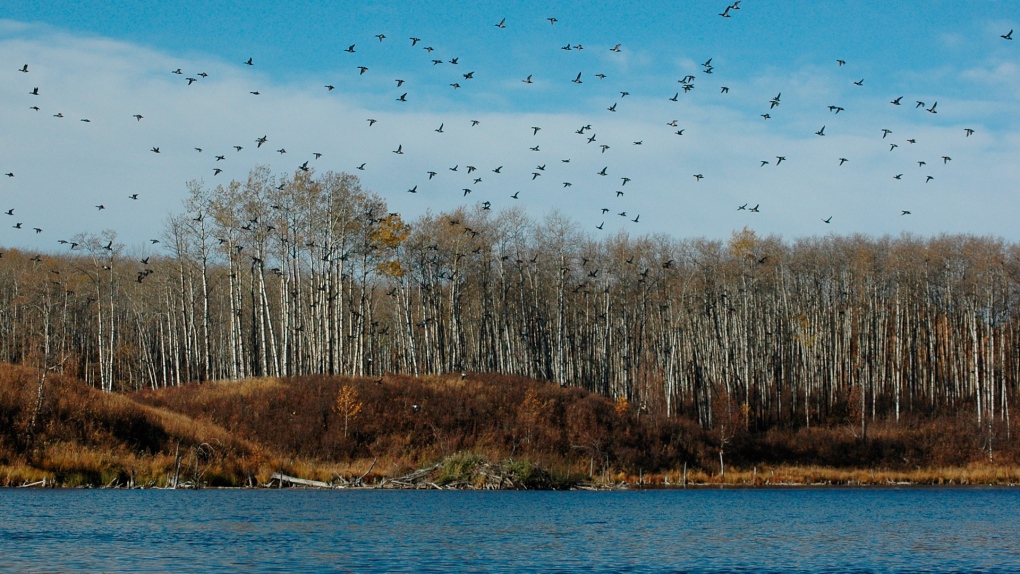Alberta biology professor helping conservation efforts close to home
 Moose Pasture. (Credit: Sean Feagan)
Moose Pasture. (Credit: Sean Feagan)
The Nature Conservancy of Canada (NCC) is celebrating the conservation of 65 hectares of private land in the Beaver Hills Biosphere.
The land is located on the east side of Elk Island National Park and is owned by University of Alberta biology professor Heather Proctor.
By entering a conservation agreement with the NCC, she agreed to limit her use of the land to protect its natural features and the species it hosts.
She also donated the conservation agreement value to the NCC.
In a news release Friday, Proctor said witnessing rapid development in the Edmonton area over the early 2000s made her feel "a need to act."
"I now feel it is secure; it's like life insurance for this property. I know that no matter what, it will still be protected, and that is a great feeling," she said.
 Ducks at Moose Pasture. (Credit: Heather Proctor)
Ducks at Moose Pasture. (Credit: Heather Proctor)
As NCC spokesperson Sean Feagan explained, the conservation agreement prevents any development on Proctor's property.
The piece of wetlands she owns is home to mature forest, moose, a number of different types of birds and amphibians, and things that aren't visible to the naked eye.
"If you want to take your microscope out, there's many fascinating species," Feagan told CTV News Edmonton.
"[Heather] has used the land as her own personal biologic research station. Heather has looked at mites on the property and she's actually found one new to science there."
Feagan continued, "It is really important just to preserve this landscape – basically, keep it the way it is."
Friday was World Wetlands Day.
The NCC estimates 64 per cent of Albert's wetlands in settled areas has been lost.
Since 2002, the organization has conserved more than 1,500 hectares in Beaver Hills, which was recognized as a UNESCO Biosphere Reserve in 2016.
"In this day and age, we understand that there are some concerning trends on the horizon, looking at some of these provincial announcements as of late about the impending drought. I think looking ahead to the season can be quite troubling, but also looking ahead into the future," Feagan said.
"We know that wetlands store vast amounts of water and they also work to filter water that we use for drinking and other sources, so wetlands are a huge resource for people and also nature. And the more we conserve, the more resilient a future we will have."
Proctor's property was named "Moose Pasture" by the NCC.
Moose Pasture is not open to the public. More information about visiting a conserved property can be found on the NCC's website.
With files from CTV News Edmonton's Kerry McAthey
CTVNews.ca Top Stories

'It's not realistic': Former PM Chretien thinks Trump will back off trade war
Former prime minister Jean Chretien says U.S. president-elect Donald Trump is likely to walk back his threat of punishing tariffs and the resulting trade war with Canada, because the Americans are too reliant on a number of Canadian exports, namely in the energy sector.
'I didn't want to go cold turkey:' Environment Canada's David Phillips on why he keeps working after retirement
When Environment Canada Senior Climatologist David Phillips retired this past September, he wasn’t quite ready to call it a career.
With their Los Angeles-area homes still smoldering, families return to search the ruins for memories
Since the flames erupted in and around Los Angeles, scores of residents have returned to their still smoldering neighborhoods even as the threat of new fires persisted and the nation's second-largest city remained unsettled.
This Canadian teen lost her hands and feet to an infection. She's on a mission to share her story
A Canadian teen is reaching audiences around the world with powerful social media videos showing life without hands and feet – the price she paid after developing sepsis.
The implications for Canada if Trump goes through with his punishing Tariffs
A trillion dollars worth of Canadian goods and services are exported out of the country annually with a third of it going to the United States. One economist says if Trump imposes a 25 per cent tariff on those goods, it will be detrimental to the Canadian economy.
opinion Financial survival tips for the sandwich generation
The so-called 'sandwich generation' finds itself in a unique and challenging position as its members balance providing financial support for both aging parents and children, all while managing their own financial goals.
Most Canadians say GST tax break will have no impact on finances: Nanos survey
Many Canadians believe that the GST/HST tax break will have little to no impact on their finances, according to a new survey.
It's sick season. Here's how to protect yourself from norovirus, COVID-19, flu and RSV
While many of the germs that cause this misery can circulate throughout the year, scientists think that the winter surge of flu and cold activity may be because we spend more time indoors and the cold, dry air may weaken our defences.
Trudeau asked Trump for California, Vermont to curb annexation talks
Justin Trudeau says U.S. president-elect Donald Trump kicked the tires on the potential annexation of Canada during their recent meeting in Florida, but the topic was quickly dropped when the prime minister countered with a request for two states.

































